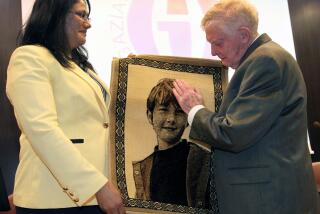To the Lawyer, This Client Is a Privilege
- Share via
Long before their first meeting Friday in the sterile hall outside a Los Angeles County courtroom, William Grignon had formed a special bond with 2-year-old Nicolas Harrell.
Grignon, 48, is an attorney who specializes in litigation and bankruptcy. But he offered his services free to handle the adoption of Nicolas.
Nicolas, who has been a foster child almost since birth, is legally blind. He wears thick glasses that dwarf his animated features, and he faces the prospect of many operations to preserve his limited sight.
But where some might predict a future filled with anguish, Grignon imagines one filled with potential. And he offers himself as an example: At the age of 7 he was diagnosed with a degenerative eye disease that left him blind at 32.
An attorney for two years at the firm of Kirkland & Ellis, he said Nicolas’ case was close to his heart. He wants more people to adopt disabled children, who often have trouble finding permanent homes.
“I think in our society blindness is viewed with a certain amount of fear, and that fear can be directed toward children who may not understand ... and say, ‘What’s wrong with me?’ ” said Grignon. “Why not have the anticipation that this child will thrive in the future?”
Grignon went to law school after he lost his vision and graduated second in his class from Pepperdine University.
“With modern technology there’s no reason why a blind child can’t succeed, especially in fields where vision isn’t essential,” he said. “Being a race-car driver or a brain surgeon might be challenging, but there are any number of professions that are open like art, law and teaching.”
At the Edmund D. Edelman Children’s Court in Monterey Park, Grignon, in a dark suit and tie with his walking stick at hand, fidgeted as he waited for Nicolas to appear with his future mother, Brenda Joyce Robinson, who was also his foster mom.
Grignon had prepared the documents and spoken with the members of the family but had never met them.
The waiting area was filled with excited children and families. Kirkland & Ellis attorneys, all working pro bono, were helping to complete adoptions for 13 families and 16 children on what was a mini-adoption day.
The event, held several times during the year with different law firms, is the idea of the Alliance for Children’s Rights, a child advocacy group that works with the Department of Children and Family Services to supervise adoptions.
Cynthia Billey, an alliance attorney who heads the adoption project, said many families feel unequipped to deal with disabled children.
“Such families qualify for higher foster care benefits and adoption assistance,” said Billey. “The family can feel comfortable knowing that they’re going to have the support they need, but the system needs to do a better job of making sure they know what’s available and they get it.”
As Grignon waited anxiously, his assistant, Mark Wilson, also paced. Wilson, a paralegal and legal secretary for 13 years, joined Grignon in July and has readily adapted to the unusual demands of his new job.
“I love my job,” said Wilson. “There’s a lot more involved here than at other firms I’ve been at because Will needs different kinds of assistance. A lot of it is about trying to figure out how to get information to Will so that he can synthesize it.”
They are aided by digital scanners and talking computers. Wilson describes charts and diagrams until Grignon can picture them in his mind.
“Will has an amazing memory,” said Wilson. “He’ll ask me for a document and say we got it on Dec. 12, and he’ll be exactly right.”
The third member of Grignon’s team is his wife, Meghan O’Leary, an outgoing, energetic woman who frequently accompanies her husband on special cases like this one.
“It amazes me how he makes the most of any opportunity to make a difference,” said O’Leary of her husband, whom she met 14 years ago when he walked into her family’s Massachusetts gym looking for a trainer.
By then he was completely blind after a gradual loss of sight from retinitis pigmentosa that left him angry and frustrated during his youth. As a youngster he wore thick magnifying glasses, and the other kids called him “eight eyes.” He received an undergraduate degree in English and tried to earn a living by writing, but mostly lived off his government disability checks.
“That can be a deadly trap for the disabled,” Grignon said. “You get conditioned, and it narrows the scope of your horizon to that monthly check. You become a ward of the state, and it’s a challenge to your spirit.”
His life brightened though when he met O’Leary, and they migrated west so that Grignon could attend screenwriting school at UCLA. He obtained his degree but said he was shocked to discover that 90% of the success screenwriters have comes from pitching the script to studios. That is when he turned to law school, although he says he still loves to write.
On Friday, as Grignon was standing in front of the courtroom where his case would be heard, a little boy bursting with energy ran up and almost careened into him.
When Grignon knelt down, Nicolas, in a silver-and-blue Superman jacket and tennis shoes, burst into laughter and gave him a big hug, prompting everyone waiting to ooh and ahh.
Nicolas was trailed by Robinson and other family members, including Atyana, 4, Nicolas’ sister, whom Robinson adopted three years ago. Robinson is the children’s great aunt.
Doctors told her that Nicolas was probably born blind with glaucoma, but his condition was not discovered until he was several months old, she said. He has had surgery, but doctors are unsure if he will keep his limited sight.
The family and Grignon were ushered into the courtroom, and after a 10-minute hearing Robinson was declared Nicolas’ mother by Court Referee Jacqueline Lewis.
During the ceremony Nicolas thumbed through a blue-bound family law book lying on a table and gleamed with joy when he had his picture taken with Lewis.
Afterward, Robinson said Grignon was an inspiration for Nicolas’ future. “I hope and pray he has a chance in life like any other ordinary kid,” she said.
As for Grignon, he said nothing about the dry court procedure ever feels routine to him. “If it ever does I’ll have to check my pulse. You have to always keep in mind this is a momentous situation, and these kids are finally being adopted by loving parents.”
More to Read
Sign up for Essential California
The most important California stories and recommendations in your inbox every morning.
You may occasionally receive promotional content from the Los Angeles Times.














